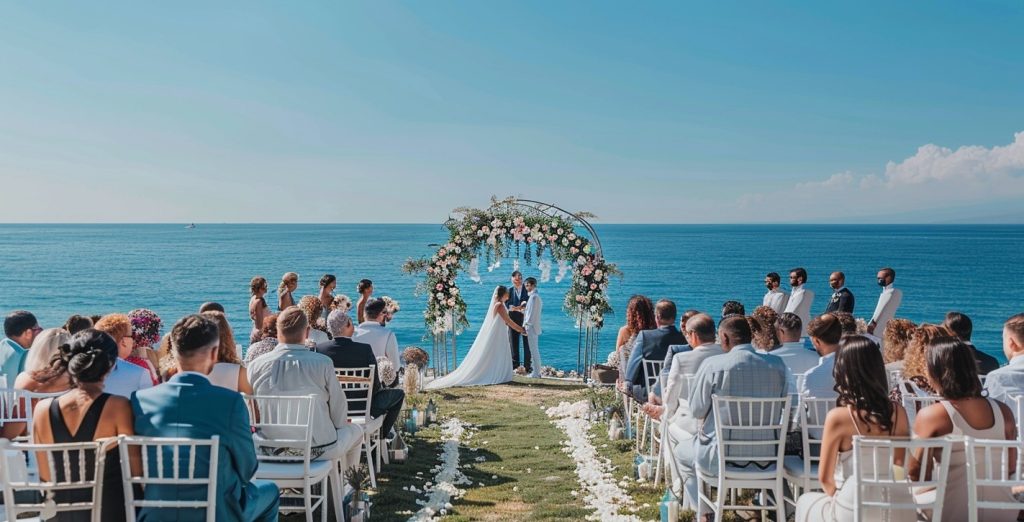Planning a wedding abroad can feel like an exciting yet slightly overwhelming adventure. With breathtaking locations and unique experiences, destination weddings give you the chance to create unforgettable memories.
Navigating all the logistics can get a bit tricky, but don’t worry. This article breaks down the essential steps to make sure your planning process is smooth and enjoyable.
From figuring out your budget and picking the perfect venue to understanding legal requirements and accommodating your guests, you’ll find all the info you need right here.
Whether you dream of a beach ceremony or a charming countryside celebration, this checklist will help you turn that vision into reality.
1. Determine Your Budget
When you’re planning a wedding abroad, the first and most crucial step is determining your budget. It’ll guide nearly every decision, from choosing venues and accommodations to figuring out catering and entertainment for your destination wedding.
To create a realistic budget, think about both fixed expenses—like venue rental and officiant fees—and variable costs, such as flowers and hair and makeup services. It’s essential to prioritize items like the venue, catering, and photography; these typically form the backbone of your celebration and can often be adjusted if needed.
You should also look for discounts or group rates for accommodations and travel since many hotels and venues offer packages that can help lower overall costs. Utilizing online resources and chatting with vendors about special promotions can stretch your budget even further while ensuring you have a memorable event.
2. Decide on a Destination
Choosing the right destination for your wedding abroad is such an exciting milestone! Just think about how local attractions, weather conditions, and transportation options can really shape your wedding experience and how comfortable your guests will be.
You’ll want to dig deep into potential locations, checking not only how easy it is to get there via major airports and local transit but also what the typical climate is like during your chosen season. Each destination has its own unique local attractions that can really amp up the celebration, from breathtaking natural views to lively cultural festivities.
Don’t forget to align your choices with cultural considerations. Understanding local customs can make the whole experience more respectful and enriching for everyone involved. Plus, prioritizing your personal preferences and existing wedding themes will help you find a destination that truly resonates with your vision, all while making sure your guests enjoy every moment of this incredible journey.
3. Research Marriage Requirements
Understanding the legal requirements for getting married abroad is essential since every destination has its own set of rules about marriage licenses, paperwork, and important documents like marriage certificates and visas.
To make sure your wedding goes off without a hitch, it’s a good idea to dive in and create a checklist of the local marriage laws and requirements. Start by checking out the official government websites of your chosen destination or getting in touch with the local consulate. They can give you the lowdown on what documents you’ll need, like proof of identity or residency, and any waiting periods you should be aware of.
Don’t hesitate to reach out to local officiants who know the ins and outs of the customs and legal details involved in ceremonies. They can provide you with valuable tips on navigating local traditions, ensuring you tick all the legal boxes before the big day. This way, you can avoid any last-minute stress or confusion.
4. Find and Book a Venue
Finding and booking the perfect venue is essential for your destination wedding. It sets the tone for both the ceremony and reception while accommodating your guest list and fitting within your budget and style.
To make a well-informed decision, it’s crucial for you to do thorough research on potential venues. Start by comparing features like location, aesthetic, and the amenities offered to ensure they align with your vision.
Visiting in person can give you valuable insight, but if traveling isn’t feasible, many venues offer virtual tours that let you explore the space from the comfort of your home.
Once you’ve narrowed down your options, don’t forget to negotiate the contracts. Understanding cancellation policies is vital in case plans change unexpectedly. Also, check if the venue can provide accommodations for your guests, and assess their facilities to make sure everything meets your needs for a smooth experience.
5. Hire a Wedding Planner or Coordinator
Hiring a wedding planner or coordinator who specializes in destination weddings can really take a load off your shoulders. They’ll handle everything from contracts to vendor comparisons, making sure every detail is managed perfectly.
By choosing a local expert, you’ll tap into a vast network of trusted vendors and venues that really match the vibe of the area. These professionals understand the local customs and traditions, which can make your wedding feel more authentic and special for you and your guests.
They’re pros at timeline management, ensuring everything flows smoothly throughout the event. With their expertise, every logistical detail—like transportation and catering—gets coordinated seamlessly, so you can enjoy celebrating your big day without stressing over all the little things.
6. Arrange Travel and Accommodations for Guests
Arranging travel and accommodations for your guests is a crucial part of planning a destination wedding. It makes sure everyone can comfortably attend, and it allows you to take advantage of group travel discounts and local transportation options.
When you communicate these details effectively, you can really elevate the guest experience, making everyone feel informed and appreciated. Start by putting together a comprehensive itinerary that includes flight options and hotel recommendations for different budgets. Don’t forget to highlight nearby attractions and transportation methods; this not only simplifies logistics but also encourages guests to explore the destination.
You might even want to create a dedicated website or group chat where guests can find all the necessary information in one spot and ask any questions they may have. By catering to various preferences and financial situations—offering both luxurious and budget-friendly accommodation options—you’ll create a welcoming atmosphere that ensures all attendees feel valued.
7. Plan for Legal Documents and Paperwork
Planning the necessary legal documents and paperwork is crucial when you’re organizing a wedding abroad. Each destination has its own unique requirements for getting a marriage license and making sure your marriage is legally recognized.
To tackle this complex process, you should dive into the specific documents needed for your chosen location. This often includes valid identification, proof of residency, and birth certificates. If those documents aren’t in the local language, you might need certified translations.
Understanding local laws is key to dodging any last-minute headaches, so make sure to keep secure copies of all important documents, both physical and digital, to protect against potential losses while traveling. Being well-prepared not only eases your stress but also paves the way for a smooth and joyful wedding experience.
8. Choose Vendors
Choosing the right vendors is super important for bringing your wedding vision to life. Whether it’s catering, photography, videography, or floral arrangements, you want to make sure they fit your budget and style preferences.
To kick off the vendor selection process, dive into some thorough research and compare local options. Check out reviews on platforms like Yelp or WeddingWire, and definitely ask friends and family for their recommendations based on their own experiences.
Engaging directly with potential vendors is key. Setting up meetings gives you a chance to really understand their services and get a feel for their personalities. Don’t forget to carefully review contracts to clarify all the details and avoid any surprises later on.
It’s also a good idea to ask about insurance and backup plans to give yourself peace of mind, ensuring everything goes smoothly on your special day.
9. Create a Timeline and Schedule
Creating a detailed timeline and schedule is key to making sure every part of your destination wedding flows smoothly, from the ceremony to the reception and everything in between.
When you thoughtfully plan each segment of the day, you can minimize those last-minute surprises and really soak in the joy of your big occasion without the added stress. It’s super important to sit down with your wedding planner and map out a comprehensive agenda that matches your vision for the day. Collaborating with your vendors helps set clear expectations about everything—arrival times, services, you name it—so everyone’s on the same page.
As you outline your planning process, don’t forget to include key milestones like venue bookings and dress fittings to keep things moving along smoothly. Remember, clear communication is the backbone of a successful celebration, allowing you to focus on making unforgettable memories.
10. Plan for Any Cultural Differences
When you’re planning a wedding abroad, it’s super important to think about cultural differences. Local customs and traditions can really shape everything—from the ceremony to the reception and how your guests experience the whole event.
To make sure your wedding is authentic and resonates with both your heritage and the local culture, you’ll want to dig deep into the customs and etiquette of the area. Connecting with local wedding planners or trusted advisors can be a game-changer; they usually know all the ins and outs of what’s respectful and customary.
You should also take some time to learn about any unique wedding traditions in the locale, like specific rituals, attire, or food preferences. By thoughtfully incorporating these cultural elements, you can create a richer, more immersive experience that allows all your guests to appreciate the blend of traditions while feeling comfortable and included in your celebration.
What Are the Benefits of Having a Destination Wedding?
Destination weddings come with a ton of perks, like the chance to celebrate your big day in a stunning location, which not only enhances the guest experience but also creates unforgettable memories for you and everyone involved.
These gatherings often have a cozy vibe, letting you connect more intimately with your guests. Imagine having a breathtaking backdrop that turns your wedding into a mini-vacation for everyone, giving you all the chance to unwind and embark on a new adventure together.
Plus, planning a wedding away from home can make your guest list a breeze—you’re only inviting those who truly matter to you. With fewer distractions and a shared experience, your guests are likely to bond more deeply, creating a friendly atmosphere that amplifies the joy of celebrating your love.
What Are the Challenges of Planning a Wedding Abroad?
Planning a wedding abroad can be quite the adventure, but it definitely comes with its own set of challenges. You’ll have to navigate travel logistics, deal with potential language barriers, and figure out local laws and vendor availability.
These hurdles can feel pretty overwhelming, especially when you’re trying to coordinate with local vendors who might not quite grasp your vision or when you’re trying to understand regional customs that could impact your big day. To keep everything running smoothly, you might want to consider hiring a local wedding planner. They can help bridge those language gaps and offer insights into cultural expectations.
Doing thorough research on potential venues, caterers, and photographers is absolutely key, as is establishing clear communication right from the start. By preparing well in advance and embracing local traditions, you can turn these challenges into enriching experiences that beautifully reflect both the location and your personal story.
How Can You Ensure Your Guests Have a Good Time at Your Destination Wedding?
Making sure your guests have a fantastic time at your destination wedding takes some thoughtful planning. You’ll want to focus on entertainment, local cuisine, and activities that let them soak up the destination while celebrating your love.
To really make it memorable, think about adding personalized favors that reflect the local culture or tell your unique love story. These little tokens can spark cherished memories long after the event is over.
Offering fun activities, like guided tours or cooking classes, can get guests chatting and help them form special bonds. It’s also important to strike a balance between planned events and free time; give your guests the chance to explore local attractions, relax by the beach, or enjoy nearby dining options.
By doing this, you’ll ensure they cherish both the celebration and the stunning surroundings.
What Are Some Unique Ideas for a Destination Wedding?
Incorporating unique ideas into your destination wedding can truly make it unforgettable. Think about picking distinct decor themes or serving up local cuisine that reflects the culture of your chosen location.
You can explore local traditions and use vibrant color palettes that resonate with the area’s heritage, creating an atmosphere that really connects with your guests. For instance, you might include traditional floral arrangements or handmade crafts that honor local artisans, which will enhance the overall look.
Offering interactive experiences like dance lessons or cooking demonstrations can also immerse your attendees in the local culture. This way, the festivities become not just events, but engaging memories that celebrate the destination’s rich background.
Every detail—like your music selection or the ceremony rituals—can reflect the unique story of your venue, blending love and culture in a beautifully seamless way.
What Are Some Tips for Staying Within Budget for a Destination Wedding?
Staying within your budget for a destination wedding is totally doable if you plan carefully and take a strategic approach to selecting vendors, venues, and accommodations while keeping an eye out for discounts and group rates.
By prioritizing the essentials, you can trim down those pesky unnecessary expenses that often pop up during wedding planning. Plus, working with local vendors not only supports your community but can also score you better prices than those big-name suppliers.
If you’re flexible with your travel dates, consider adjusting your schedule to dodge the peak seasons—that can lead to some serious savings. And don’t forget to compare costs among different service providers; this goes for venues, catering, and entertainment too.
In terms of negotiations, being upfront about your budget constraints can help you snag better terms and maybe even some added perks, making your overall experience both memorable and budget-friendly.
Frequently Asked Questions
What is a Planning a Wedding Abroad Checklist?
A Planning a Wedding Abroad Checklist is a list of tasks and items that need to be completed and considered when planning a wedding in a different country.
Why is a Planning a Wedding Abroad Checklist important?
Having a checklist helps to ensure that all important tasks and items are not forgotten or overlooked when planning a wedding in another country, which can be a more complex and time-consuming process than planning a local wedding.
What should be included in a Planning a Wedding Abroad Checklist?
The checklist should include tasks such as researching and booking a venue, obtaining necessary legal documents, arranging transportation and accommodations for guests, selecting vendors, and creating a budget.
When should I start using a Planning a Wedding Abroad Checklist?
It is recommended to start using the checklist as soon as possible, ideally at least 12-18 months before the wedding date. This allows for enough time to complete all necessary tasks and avoid any last-minute stress.
Can I customize a Planning a Wedding Abroad Checklist?
Yes, you can customize the checklist to fit your specific needs and preferences. You may add or remove tasks, and adjust the timeline according to your wedding date and personal preferences.
What are some important things to consider when using a Planning a Wedding Abroad Checklist?
It is important to consider the cultural and legal differences of the country where the wedding will take place, as well as any potential language barriers. It is also essential to have open communication with all involved parties, including vendors and guests, to ensure a smooth planning process.



